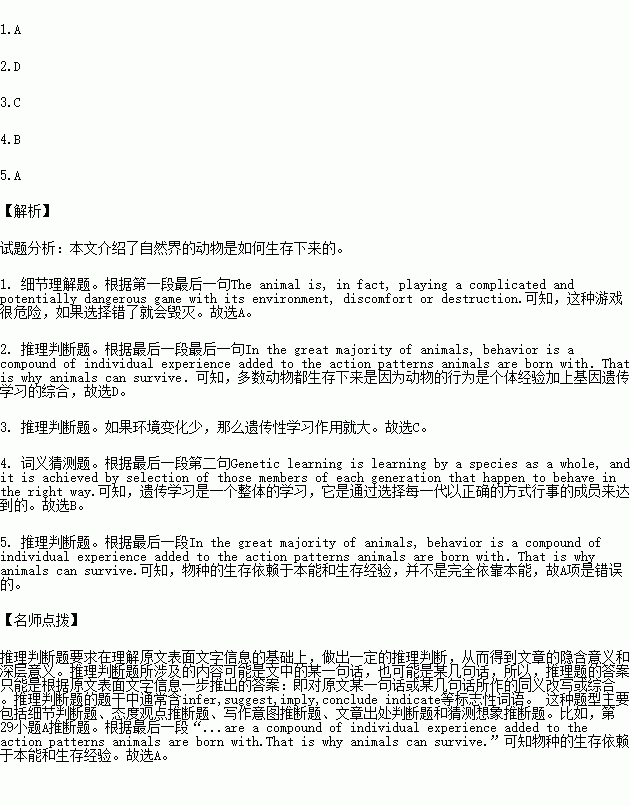题目内容
From the moment that an animal is born it has to make decisions. It has to decide which of the things around it are for eating, and which are to be avoided; when to attack and when to run away. The animal is, in fact, playing a complicated and potentially dangerous game with its environment, discomfort or destruction.
This is a difficult and unpleasant business and few animals would survive if they had to start from the beginning and learn about the world wholly by trial and error, for there are too many possible decisions which would prove fatal. So we find, in practice, that the game is always arranged in favor of the young animal in one way or another. Either the animal is protected during the early stages of its learning about the world around it, or the knowledge of which way to respond is built into its nervous system from the start.
The fact that animals behave sensibly can be attributed partly to what we might call genetic learning, to distinguish it from individual learning that an animal does in the cause of its own life time. Genetic learning is learning by a species as a whole, and it is achieved by selection of those members of each generation that happen to behave in the right way. However, genetic learning depends upon a prediction that the future will more or less exactly resemble the past. The more variable individual experience is likely to be, the less efficient is genetic learning as a means of getting over the problems of the survival game. It is not surprising to find that very few species indeed depend wholly upon genetic learning. In the great majority of animals, behavior is a compound of individual experience added to the action patterns animals are born with.That is why animals can survive.
1.The survival game is considered complicated and potentially very dangerous because ________.
A. decisions made by animals may prove fatal
B. animals are often in danger of being attacked
C. animals make decisions entirely by trial
D. environment is not fit for animals to survive
2.Most animals survive because they can make right decisions by ________.
A. a series of trials and errors
B. knowledge obtained in their life time
C. the nervous system
D. genetic learning and individual experience
3.Concerning the relationship between genetic learning and individual experience, which of the following is right?
A. They develop side by side.
B. They are contradictory, but individual experience is the dominant.
C. Genetic learning is likely to function more if the environments don’t vary much.
D. Genetic learning is more efficient than individual experience.
4.“Genetic learning” refers to ________.
A. learning after an animal is born
B. learning obtained by some members of each generation who happen to behave properly
C. learning gained by all the members in a species
D. learning gained by young animals from their experience
5.What cannot be inferred from the article?
A. The majority of animals depend thoroughly upon genetic learning.
B. Animal behave in particular ways as a result of both individual experience and genetic learning.
C. If animal depended wholly upon individual experience, its chance of survival would be little.
D. Genetic learning depends on the assumption of resemblance between the future and the past.
 学而优衔接教材南京大学出版社系列答案
学而优衔接教材南京大学出版社系列答案 小学课堂作业系列答案
小学课堂作业系列答案 金博士一点全通系列答案
金博士一点全通系列答案
